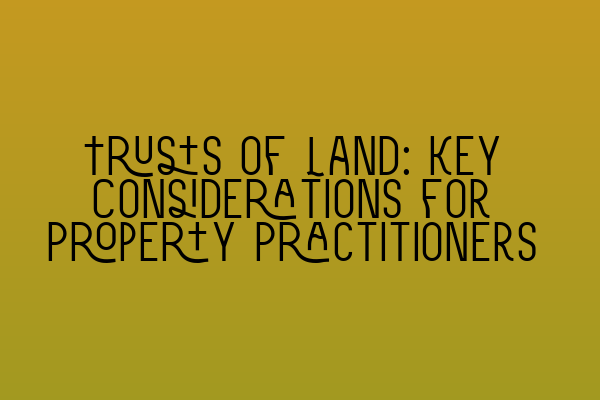Trusts of Land: Key Considerations for Property Practitioners
As property practitioners, understanding the intricacies of trusts of land is crucial to effectively advise your clients. Trusts of land are legal arrangements involving the ownership and management of property, which often arise in situations where multiple parties have rights or interests in land. In this article, we will explore key considerations for property practitioners when dealing with trusts of land.
1. Understanding the Nature of Trusts of Land
A trust of land is established when a property is held by one person (the legal owner) on behalf of another (the beneficial owner). The legal owner holds the property as a trustee, and the beneficiaries have equitable interests in the property. It is important to note that trusts of land can arise through express or implied agreements, resulting in complex legal situations.
When advising clients involved in trusts of land, it is essential to ascertain the nature of the trust, the identities of the parties involved, and the specific interests and rights they hold. Clear communication with your clients and thorough examination of relevant documents, such as trust deeds or agreements, are crucial steps in this process.
2. Identifying the Different Types of Trusts of Land
There are several types of trusts of land that property practitioners should be familiar with:
- Bare Trusts: In a bare trust, the legal owner holds the property upon trust for the beneficiary, without any active management or decision-making authority. The legal owner merely acts as a conduit, holding the property for the beneficiary.
- Resulting Trusts: Resulting trusts arise when it can be inferred that the legal owner holds the property on trust for the person(s) who contributed to its purchase or acquisition. These trusts can be presumed in certain circumstances, such as when cohabitants contribute to the purchase of a property but the legal title is held solely by one person.
- Constructive Trusts: Constructive trusts are imposed by law to recognize rights or interests in property that are not reflected in legal ownership. They typically arise in cases involving unfair conduct, breach of trust, or unconscionable behavior.
Understanding the specific type of trust is essential for determining the rights and obligations of the parties involved.
3. Consideration of Trustee Duties and Obligations
When advising clients involved in trusts of land, it is crucial to explain the duties and obligations of trustees. Trustees have a fiduciary duty to act in the best interests of the beneficiaries and exercise their powers in good faith. They must also manage the trust property responsibly and make decisions that promote the beneficiaries’ interests.
Property practitioners should emphasize the importance of proper record-keeping, regular communication with beneficiaries, and diligent management of the trust property. It is also essential to advise clients on the potential consequences of breaching trustee duties, such as legal claims by beneficiaries or even removal as a trustee.
4. Resolving Trust Disputes
Trust disputes can arise when the parties involved have conflicting interests or disagreements regarding the management or distribution of trust property. As a property practitioner, you may be called upon to help resolve these disputes and find amicable solutions.
It is important to explore alternative dispute resolution mechanisms, such as mediation or negotiation, before resorting to litigation. Engaging an independent mediator or arbitrator can facilitate constructive discussions and help preserve relationships between the parties.
To effectively navigate trust disputes, property practitioners should have a deep understanding of trust law, property rights, and relevant case law precedents. Ongoing professional development and staying up-to-date with legal developments in this area are essential.
Conclusion
Trusts of land pose particular challenges for property practitioners due to their complex nature and the multiple parties involved. By understanding the nature of trusts, identifying the different types, considering trustee duties, and being equipped to handle disputes, property practitioners can effectively guide their clients through trust-related matters.
If you require further guidance or assistance with trusts of land, our team at SQE Property Law & Land Law is here to help. Contact us today to schedule a consultation.
Related Articles:
